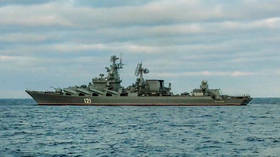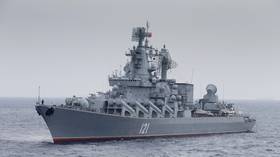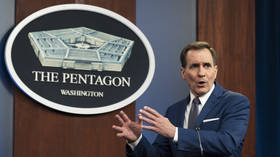US denies it helped sink Russian flagship

The US didn’t provide Ukraine with intelligence that allegedly allowed it to strike Russia’s Black Sea flagship Moskva off the coast of Odessa last month, Pentagon press-secretary John Kirby has said, in a statement to media.
He was reacting to a report by the NBC on Thursday, claiming that American officials had helped Kiev's forces to target the vessel.
“The Ukrainians have their own intelligence capabilities to track and target Russian naval vessels, as they did in this case,” Kirby said.
Russia insists that its missile cruiser wasn’t attacked, but sank on April 14 after a fire that had broken out on board caused the detonation of ammunition. One sailor was confirmed killed and 27 others are missing as a result of the incident, while 396 other crew members were safely evacuated.
According to unnamed officials who talked to NBC, Kiev had asked Washington to identify a ship sailing on the Black Sea, south of Odessa. The Americans allegedly responded that it was the Moskva and helped confirm its exact coordinates.
The US didn’t know that Ukraine was going to attack the Russian ship, and played no part in the decision to carry out the strike that it alleges it made, the sources insisted.
On Thursday, Kirby was forced to deny a quite similar report by the New York Times, which cited unnamed officials as saying that the US had assisted the Ukrainian forces in killing Russian generals by sharing data on the location of their mobile command headquarters inside Ukraine.
“We do not provide intelligence on the location of senior military leaders on the battlefield or participate in targeting decisions of the Ukrainian military,” the spokesman insisted.
However, Kirby acknowledged that sharing “battlefield intelligence to help Ukraine defend their country” was part of Washington’s assistance to Kiev amid its conflict with Russia, together with weapons shipments and financial injections.
The Pentagon spokesman announced last week that the US has already spent $4.3 billion on supporting the Ukrainian military since 2021.
Moscow has repeatedly stated such help to Kiev only destabilizes the situation on the ground and reduces the chances of reaching peace. Last month, Russia's Foreign Minister Sergey Lavrov accused the US-led NATO bloc of “essentially going to war with Russia through a proxy and arming that proxy.”
Russia attacked the neighboring state following Ukraine’s failure to implement the terms of the Minsk agreements, signed in 2014, and Moscow's eventual recognition of the Donbass republics of Donetsk and Lugansk. The German- and French-brokered Minsk Protocol was designed to give the breakaway regions special status within the Ukrainian state.
The Kremlin has since demanded that Ukraine officially declare itself a neutral country that will never join NATO. Kiev insists the Russian offensive was completely unprovoked and has denied claims it was planning to retake the two republics by force.














